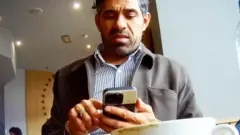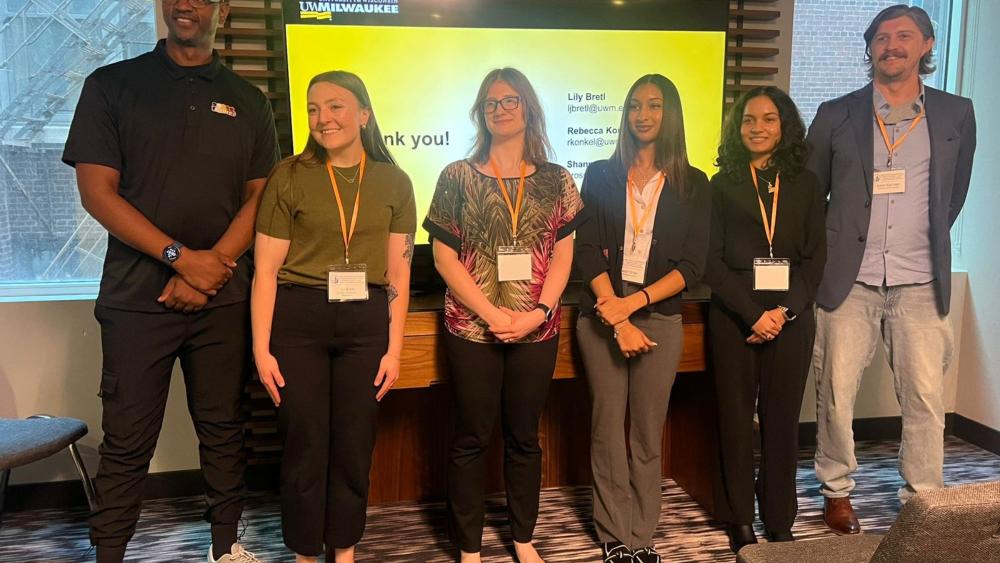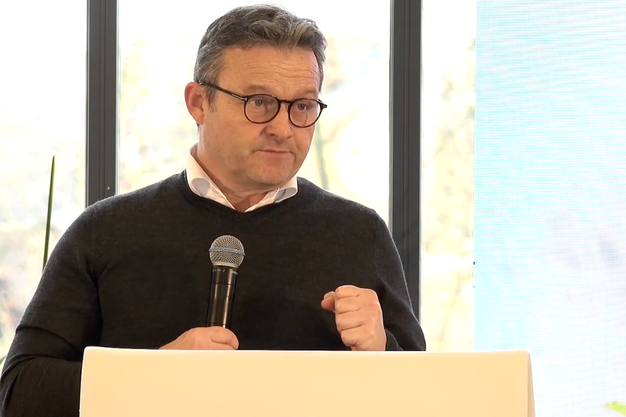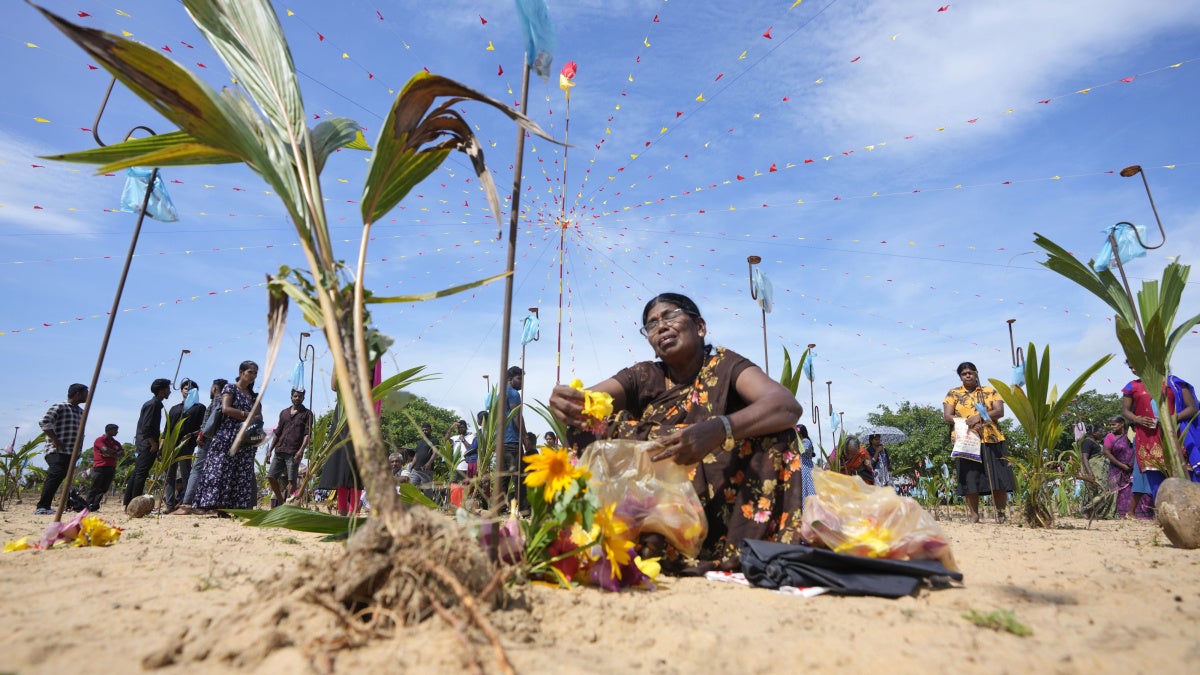Crime fixer caught by BBC offering to erase £60K fines on migrant workers – BBC

Report on an Organised Crime Network’s Impact on Sustainable Development Goals
An undercover investigation has exposed an organised crime network in the UK that facilitates illegal working and evades law enforcement, presenting a significant challenge to the achievement of multiple Sustainable Development Goals (SDGs), particularly SDG 8 (Decent Work and Economic Growth) and SDG 16 (Peace, Justice, and Strong Institutions).
Undermining SDG 8: Decent Work and Economic Growth
The network’s operations directly contravene the principles of decent work and sustainable economic growth by fostering a shadow economy built on illicit labour practices.
Promotion of Illicit and Precarious Employment
The investigation revealed a systematic process for enabling undocumented migrants, including asylum seekers, to work illegally, undermining SDG Target 8.8, which aims to protect labour rights and promote secure working environments.
- A central figure, identified as Kardos Mateen (alias Shaxawan), claimed he could establish companies for individuals without the right to work.
- The network provides essential business infrastructure, such as bank cards and payment machines, to integrate these illicit operations into the mainstream economy.
- This creates a vulnerable workforce operating outside legal protections, susceptible to exploitation and unsafe conditions.
Distortion of Fair Competition and Economic Integrity
By registering businesses under the names of proxy or “ghost” directors, the network circumvents regulations and creates an unfair advantage over legitimate enterprises. The sale of counterfeit goods further damages the formal economy.
- Trading Standards confirmed the sale of illegal cigarettes in multiple businesses registered to Mr. Mateen.
- Undercover reporters purchased counterfeit tobacco from four mini-marts where he was the listed director.
- These activities erode tax revenues and undermine legitimate businesses that adhere to legal and regulatory standards.
Assault on SDG 16: Peace, Justice, and Strong Institutions
The network actively subverts legal and regulatory frameworks, weakening the institutions essential for a just and peaceful society, in direct opposition to the aims of SDG 16.
Systematic Evasion of Justice
A key service offered by the network is the erasure of civil penalties for employing illegal workers, a direct assault on the rule of law and the integrity of immigration enforcement.
- Mr. Mateen claimed the ability to reduce fines of up to £60,000 to “zero.”
- The method involves transferring liability for fines to paid individuals, referred to as “ghost names,” who assume responsibility for the penalty.
- A paralegal, Zohaib Hussain, at RKS Solicitors was recorded offering to “make documents” and “business agreements” to help avoid penalties, compromising the integrity of the legal profession.
Exploitation of Institutional Weaknesses
The success of the network hinges on exploiting loopholes in corporate and legal systems, undermining SDG Target 16.6, which calls for effective, accountable, and transparent institutions.
- The network leverages the corporate registration system (Companies House) by appointing proxy directors, such as Bryar Mohammed Zada, who was listed as a director for 20 businesses within 12 months.
- Mr. Mateen claimed the scheme was designed to “confuse” Immigration Enforcement, suggesting the network exploits the limited resources of regulatory bodies.
Broader Implications for SDGs 10 and 3
Exacerbating Inequalities (SDG 10)
The network preys on the vulnerability of migrants and asylum seekers, deepening their exclusion and inequality. By offering a pathway into the illicit economy, it traps individuals in a cycle of precariousness, hindering progress towards SDG Target 10.7 on facilitating safe and regular migration.
Public Health Risks (SDG 3)
The sale of illegal and counterfeit tobacco in the network’s mini-marts poses a direct risk to public health, undermining SDG Target 3.a, which aims to strengthen the implementation of the WHO Framework Convention on Tobacco Control.
Institutional and Individual Responses
Following the investigation, the involved parties and authorities have responded.
- Kardos Mateen (Shaxawan) and Zohaib Hussain denied all allegations.
- RKS Solicitors suspended Mr. Hussain pending an internal review and stated it was informing the Solicitors Regulation Authority (SRA).
- The Home Secretary, Shabana Mahmood, confirmed that the Home Office would investigate the findings, acknowledging that illegal working creates an incentive for illegal immigration.
Analysis of Sustainable Development Goals (SDGs) in the Article
1. Which SDGs are addressed or connected to the issues highlighted in the article?
The article highlights issues that are directly connected to several Sustainable Development Goals. The analysis identifies the following SDGs as most relevant:
- SDG 8: Decent Work and Economic Growth: The core of the article revolves around the exploitation of the labor market, specifically the employment of “illegal workers” and “asylum seekers” outside of legal and regulatory frameworks. This directly contravenes the principles of decent work.
- SDG 10: Reduced Inequalities: The criminal network preys on vulnerable groups, including migrants and asylum seekers. The article discusses how “loose regulation of Britain’s labour market is acting as a pull factor for those entering the UK illegally,” connecting the issue to broader migration policies and the inequalities faced by these populations.
- SDG 16: Peace, Justice and Strong Institutions: The article is a case study in the breakdown of justice and institutional integrity. It details the operations of an “organised crime network,” exposes corruption within the legal system (a paralegal offering to falsify documents), and shows how criminals exploit institutional weaknesses to “confuse’ immigration enforcement” and evade the rule of law.
2. What specific targets under those SDGs can be identified based on the article’s content?
Based on the issues discussed, several specific SDG targets can be identified:
-
SDG 8: Decent Work and Economic Growth
- Target 8.8: Protect labour rights and promote safe and secure working environments for all workers, including migrant workers… and those in precarious employment.
The article directly addresses the violation of this target. The entire criminal enterprise is built on facilitating “undocumented working” for migrants and asylum seekers. These workers are, by definition, in precarious employment, lacking legal protection, rights, and a safe working environment. The network enables employers to bypass laws designed to protect workers, as evidenced by the scheme to “erase fines of up to £60,000 for employing illegal workers.”
- Target 8.8: Protect labour rights and promote safe and secure working environments for all workers, including migrant workers… and those in precarious employment.
-
SDG 10: Reduced Inequalities
- Target 10.7: Facilitate orderly, safe, regular and responsible migration and mobility of people, including through the implementation of planned and well-managed migration policies.
The article highlights the consequences of failures in migration policy. The government’s acknowledgement that the “loose regulation of Britain’s labour market is acting as a pull factor for those entering the UK illegally” shows a direct link between economic loopholes and disorderly migration. The criminal network thrives by exploiting this very lack of orderly and regular pathways for migrants.
- Target 10.7: Facilitate orderly, safe, regular and responsible migration and mobility of people, including through the implementation of planned and well-managed migration policies.
-
SDG 16: Peace, Justice and Strong Institutions
- Target 16.4: …combat all forms of organized crime.
The investigation explicitly uncovers an “organised crime network” profiting from illegal activities. The article details its sophistication and scale, from setting up fraudulent businesses to selling “counterfeit tobacco.” The network’s activities represent a clear challenge to this target. - Target 16.5: Substantially reduce corruption and bribery in all their forms.
The article provides direct evidence of corruption. A paralegal at a solicitor’s firm offers to “‘make documents’, including ‘business agreements’, to avoid fines.” Furthermore, the network’s method of using “ghost names” who are “paid to put their names to large fines” is a form of bribery and fraud designed to subvert justice. - Target 16.6: Develop effective, accountable and transparent institutions at all levels.
The criminals’ ability to operate demonstrates weaknesses in institutional oversight. The network’s stated goal is to “‘confuse’ Immigration Enforcement teams which ‘won’t have the time’ to check details.” The ease with which individuals like Bryar Mohammed Zada can accumulate “company directorships for 20 car washes and mini-marts” points to vulnerabilities in the company registration system (Companies House).
- Target 16.4: …combat all forms of organized crime.
3. Are there any indicators mentioned or implied in the article that can be used to measure progress towards the identified targets?
The article implies several qualitative and quantitative indicators that could be used to measure progress:
-
Indicators for SDG 8 (Decent Work and Economic Growth)
- Prevalence of illegal employment: The existence of “illegal workers” and “asylum seekers” running businesses is a direct indicator of the failure to ensure decent work for all. A reduction in the number of such cases would indicate progress.
- Value and number of fines for illegal working: The article mentions “fines of up to £60,000.” Tracking the number and value of fines issued and successfully collected by Immigration Enforcement could serve as an indicator of enforcement effectiveness.
-
Indicators for SDG 10 (Reduced Inequalities)
- Rates of irregular migration: The reference to a “pull factor for those entering the UK illegally” implies that the number of people entering and working without authorization is a key metric for assessing the effectiveness of migration policies.
-
Indicators for SDG 16 (Peace, Justice and Strong Institutions)
- Number of organized crime groups dismantled: The investigation focuses on one “organised crime network.” An indicator of progress would be the number of similar networks identified and successfully prosecuted by law enforcement.
- Instances of corruption in the legal and business sectors: The actions of the paralegal and the use of “ghost director[s]” are clear instances of corruption. Tracking the number of professionals sanctioned (the article notes the paralegal was suspended and the Solicitors Regulation Authority informed) and the number of fraudulent company registrations detected would be relevant indicators.
- Volume of illicit goods seized: The fact that “illegal cigarettes” and “counterfeit tobacco” were being sold in multiple businesses is an indicator of illicit trade. The volume and value of such goods seized by authorities like Trading Standards would measure progress in combating this aspect of organized crime.
4. Summary Table of SDGs, Targets, and Indicators
| SDGs | Targets | Indicators Identified in the Article |
|---|---|---|
| SDG 8: Decent Work and Economic Growth | 8.8: Protect labour rights and promote safe and secure working environments for all workers, including migrant workers. |
|
| SDG 10: Reduced Inequalities | 10.7: Facilitate orderly, safe, regular and responsible migration and mobility of people. |
|
| SDG 16: Peace, Justice and Strong Institutions |
16.4: Combat all forms of organized crime.
16.5: Substantially reduce corruption and bribery. 16.6: Develop effective, accountable and transparent institutions. |
|
Source: bbc.com
What is Your Reaction?
 Like
0
Like
0
 Dislike
0
Dislike
0
 Love
0
Love
0
 Funny
0
Funny
0
 Angry
0
Angry
0
 Sad
0
Sad
0
 Wow
0
Wow
0















































































